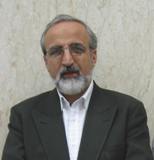Reza Malekzadeh
Iranian medical scientist and gastroenterologist From Wikipedia, the free encyclopedia
Reza Malekzadeh (Persian: رضا ملکزاده; born 1952 in Kazerun, Fars province, Pahlavi Iran) is an Iranian medical scientist and gastroenterologist.
Reza Malekzadeh | |
|---|---|
 Malekzadeh in 2006 | |
| Minister of Health and Medical Education | |
| In office 5 March 1991[1] – 16 August 1993[2] Acting: 14 January – 5 March 1991[3] | |
| President | Akbar Hashemi Rafsanjani |
| Preceded by | Iradj Fazel |
| Succeeded by | Alireza Marandi |
| Personal details | |
| Born | 16 January 1952 Baladeh, Kazerun County, Fars province, Imperial State of Iran |
| Political party | Executives of Construction Party |
| Alma mater | Shiraz University of Medical Sciences |
Career
Malekzadeh studied medicine at Shiraz University. He continued his studies to become specialized in Internal Medicine in Shiraz University where he did as well his fellowship in gastroenterology. In 1985, he joined the department of gastroenterology at Free Royal Hospital in London. After his return to Iran, he got a faculty position at Shiraz University and later on at Tehran University of Medical Sciences where he is currently a full professor of internal medicine. He is also an Honorary Professor at University of Birmingham, UK.
Reza Malekzadeh was the Minister of Health of Iran's government from 1991 to 1993. From 2000 to 2004, Malekzadeh was the secretary of the Iranian Academy of Medical Sciences , and since 2005, the academy's vice-president for research. He is the director of Digestive Disease Research Center , and was appointed as the director of Shariati Hospital in 2007. Dr Malekzadeh is also the Deputy-Editor of Archives of Iranian Medicine .
He is working on a big cancer cohort in Bandar-Turkeman, Golestan Province of Iran to investigate the environmental and genetic causes of oesophageal cancer.
Achievements
Besides being a renowned gastroenterologist, Professor Malekzadeh has been instrumental in designing and executing an efficient and practical way of diagnosing cancerous and benign esophageal lesions in Iran, applicable to urban and rural areas. He was elected as a member of TWAS in 2004.
Reza Malekzadeh received the "Permanent Personages Award" in the Third Permanent Personages session held on October 22, 2003. This national award is given to the most outstanding and memorable citizens of Iran. He has numerous reputable scientific publications in gastroenterology and liver diseases. Dr Malekzadeh was selected as distinguished professor of Tehran University of Medical Sciences in 2008.
Views
During the COVID-19 pandemic in Iran, Supreme Leader Ali Khamenei and general Hossein Salami had suggested that the coronavirus pandemic in the country was due to a biological attack. On 13 March, Reza Malekzadeh rejected this theory.[4]
Family life
Dr Malekzadeh was born in the village of Baladeh in Fars. Reza Malekzadeh has been married for 31 years, and since then has had 4 children, three girls and one boy, three of which have followed his footsteps in the study of medicine and one who is currently studying architecture. He still visits Baladeh regularly and contributes massively to humanitarian work in the area.
Memberships
- Member of the International Association for Study of the Liver (IASL)
- Member of the American Gastroenterology Association (AGA)
- Member of the European Association for Gastroenterology & Endoscopy (EAGE)
- Member of the American Society for Gastrointestinal Endoscopy (ASGE)
- Secretary of the Iranian Society of Gastroenterology and Hepatology
- Member of the Iranian Society of Physicians
- Counsellor of the Iranian Board of Internal Medicine
- Permanent Member of the Iranian Academy of Medical Sciences
- Member of the American Association for Advancement of Science (AAAS)
See also
References
External links
Wikiwand - on
Seamless Wikipedia browsing. On steroids.
